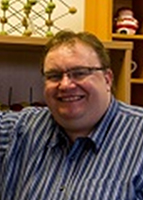Time: 20th July, 2018, 10:00 am
Venue: 3rd Floor Conference Room, Catalysis Building
Lecturer: Prof. Michael W. George, University of Nottingham, UK

Abstract:
This lecture will show how the combination of photochemistry and fast spectroscopy in conventional and supercritical fluids is used to shed new light on chemical processes and will introduce each of these approaches and show they can be used to contribute to the following areas:
Organometallic Alkane Complexes, Noble Gas Complexes and C-H Activation: The lecture will present recent results in both of these areas particularly new insight into the C-H activation alkanes and the facile generation of organometallic Xe complexes in conventional solvents at room temperature.
Photochemistry in Flow: This lecture will summarize our progress, in the context of photo-catalytically generated singlet O2 and other reactions; development of new reactors and approaches for manufacturing of pharmaceutical compounds using light and the recent synthesis in flow of the anti-malaria drug artemisinin.
Introduction:
Professor Michael W. George received his B.Sc. and Ph.D. from the University of Nottingham in 1987 and 1990, respectively. He remained at Nottingham for a further 18 months as a Postdoctoral Fellow and then was awarded a Royal Society/STA of Japan Postdoctoral Fellowship to work on organic photochemistry with Professor Hiro-o Hamaguchi at the Kanagawa Academy of Science and Technology (KAST). He returned to the University of Nottingham as an Experimental Officer (1993) and was appointed to a Lectureship in Inorganic Chemistry in 1998. He was then promoted to a chair in 2002. Prof. George received several awards including the Royal Society of Chemistry Edward Frankland Fellowship (2002-03), Corday-Morgan Medal (2004), Photochemistry Award (2005) and the 2005 Masao Horiba Special Award by Horiba Ltd. Japan. The George’s Group focuses on exploiting photochemistry and time-resolved spectroscopy to characterize intermediates and elucidate reaction mechanisms with particular emphasis on organometallic and coordination chemistry. Current research projects span both inorganic and organic photochemistry and fall into different areas including: activation of small molecules; inorganic/organic/catalytic mechanisms; excited states & electron and energy transfer.
Contact: ZHENG Min DNL16
Phone: 84379005